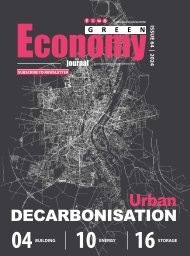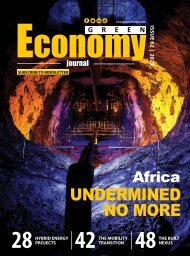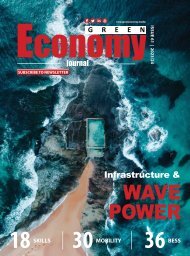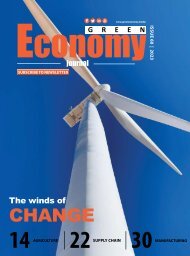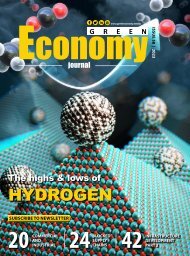Green Economy Journal Issue 63
Create successful ePaper yourself
Turn your PDF publications into a flip-book with our unique Google optimized e-Paper software.
CIRCULARITY<br />
10 Recyclables You Should Be Keeping Out Of Your Bin For Recycling Collectors<br />
The informal recycling sector has experienced substantial growth over the years.<br />
Waste is not waste if it has value: value for people, the economy, and the<br />
environment.<br />
Covering significant distances on foot every day,<br />
collectors weave through suburbs, cities and<br />
communities to retrieve ‘waste’ in return for cash.<br />
Recycling ensures that valuable materials are diverted<br />
away from landfills, which are rapidly reaching<br />
capacity. These materials are sorted and sent to<br />
recycling mills and factories for conversion into usable<br />
and commercially viable products.<br />
Recycling collectors do not take all<br />
recyclables<br />
Several recyclables are like gold for waste collectors,<br />
but unfortunately just because it’s recyclable or<br />
recycled in South Africa, does not mean a waste<br />
collector will take it. They will only take items for which<br />
they will earn money, and they will not take items that<br />
they cannot sell or which are too heavy to pull over<br />
long distances.<br />
With a bit of kindness and thought about your own<br />
refuse habits, you can make their work a little quicker<br />
and easier.<br />
Keeping recyclable paper clean and dry is<br />
paramount. As a raw material that can be used in<br />
new paper products, it should not be<br />
contaminated by wet and rotting food waste,<br />
liquids or pet waste.<br />
10<br />
RECYCLABLE ITEMS<br />
TO KEEP ASIDE FOR<br />
RECYCLING COLLECTORS<br />
1. Brown cardboard boxes<br />
2. Food packaging such as cereal,<br />
Pizza and take-away boxes<br />
(Remove food residue)<br />
3. Grocery delivery bags and<br />
Take-away bags<br />
4. Used office paper<br />
5. Plastic milk bottles<br />
6. PET soft drink bottles –<br />
Various sizes<br />
7. Fabric softener bottles<br />
8. Milk and juice cartons<br />
9. Aluminium<br />
Soft drink cans<br />
10. Food cans<br />
to guide and inform the sector, and innovative technologies, many<br />
of which are now being further developed or implemented together<br />
with private sector partners.<br />
For example, we’re seeing really interesting and beneficial<br />
research out of the Council for Scientific and Industrial Research’s<br />
(CSIR) Biorefinery Industry Development Facility (BIDF) on the<br />
recovery of high-value products from forestry, pulp and paper<br />
sector waste streams. These technologies have the potential to<br />
reduce the environmental burden on industries and to unlock<br />
new enterprises.<br />
The Waste RDI Roadmap, as a strategic document to guide<br />
the investment and direction in waste research, development<br />
and innovation in South Africa, comes to an end now in 2025.<br />
But we won’t stop what we’re doing. There’s still so much work<br />
to be done in this space. Instead, the activities of the Waste RDI<br />
Roadmap are being incorporated into the Department of Science<br />
and Innovation’s new Science, Technology and Innovation for a<br />
Circular <strong>Economy</strong> (STI4CE) Strategy. This new strategy is currently<br />
being finalised in response to government’s new STI Decadal Plan<br />
(2022-2032) which recognises the circular economy as a growth<br />
opportunity for South Africa.<br />
Because most of the Waste RDI Roadmap research is publicly<br />
funded, the outputs are made available on the Waste RDI Roadmap<br />
website for everyone to access. We hope that business will engage<br />
with this research, and with our research community, to use this<br />
evidence and to adopt these technology solutions into their business<br />
practices, thereby uplifting the entire sector.<br />
What does the circular economy mean for South Africa as a<br />
developing country?<br />
This concept of a circular economy – to design out pollution and<br />
waste, to keep products and materials in use and to regenerate<br />
natural systems – has gained a lot of traction globally and locally<br />
over the past five or so years. There is still, unfortunately, this<br />
misnomer that the circular economy is just about waste, or worse<br />
still, that it’s a synonym for recycling.<br />
Waste is a logical entry point into the circular economy, a “low<br />
hanging” fruit in terms of implementing circular solutions, but there<br />
is so much more to the circular economy than that. The circular<br />
economy is really about sustainable resource management. I would<br />
go so far as to say that the circular economy is about national<br />
The circular economy is about<br />
national resource-security in support<br />
of socio-economic development.<br />
resource-security in support of socio-economic development –<br />
through sustainable resource utilisation. This is why transitioning<br />
to a more circular economy is no longer a nice-to-have, but an<br />
economic, social and environmental imperative for every country.<br />
Research by the CSIR has shown that resource scarcity is a driver<br />
for South Africa to transition to a more circular economy. We’ve<br />
seen the impacts of energy insecurity on the national economy,<br />
and water insecurity on regional and local economies. Available<br />
information suggests that South Africa has 18 critical and strategic<br />
minerals, five of which have less than 50 years of economically<br />
viable mining remaining, assuming no new reserves are found.<br />
And unfortunately, more than 90% of these minerals are exported<br />
leaving us with little ability to recover them at end of product life and<br />
reintroduce these resources back into the South African economy.<br />
Materials insecurity, particularly for non-renewable resources,<br />
is therefore a reality for South Africa, as it is for all countries. I<br />
believe though, that the circular economy also presents significant<br />
opportunities for South Africa and Africa – a different kind of growth<br />
path for the continent – a more sustainable, low-carbon, efficient<br />
and sufficient growth path that meets the needs of all, and with it<br />
the potential to create significant jobs. And that’s incredibly exciting.<br />
How does waste-to-energy fit into a circular economy?<br />
This question really depends on how you define waste-to-energy<br />
(WtE). It’s a very broad term which encompasses many technology<br />
solutions, from landfill gas recovery to low temperature bio-WtE<br />
technologies such as anaerobic digestion or biogas recovery, to<br />
high-temperature thermal-WtE technologies such as incineration,<br />
pyrolysis and gasification. I do believe that bio-WtE technologies like<br />
biogas recovery from organic waste streams such as food, garden<br />
or agricultural waste is integral to a circular economy.<br />
However, thermal-WtE technologies are really about the<br />
destruction of waste streams, the destruction of resources,<br />
either because they are not technically or economically reusable<br />
or recyclable (design flaw), or because we have failed to put the<br />
Golden rules for recycling<br />
Separate recyclables<br />
And food/wet waste.<br />
1. 3.<br />
Get a bin, box or<br />
bucket for your<br />
recyclables.<br />
Recycling containers<br />
don’t need to be<br />
fancy or expensive.<br />
2. 4.<br />
5.<br />
Keep paper recyclables<br />
clean and dry.<br />
Give plastic, glass and<br />
cans a light rinse if<br />
needed, using dirty dish<br />
water.<br />
Get the family involved<br />
and make sure everyone<br />
knows what is recyclable.<br />
Putting People, Paper And<br />
The Planet At The Centre<br />
Of The Circular <strong>Economy</strong>.<br />
www.fibrecircle.co.za | 011 593 3144<br />
37




